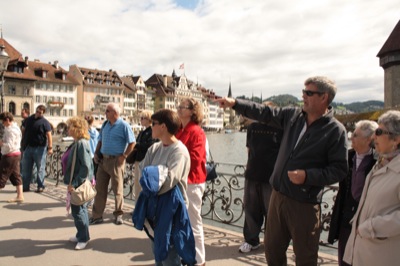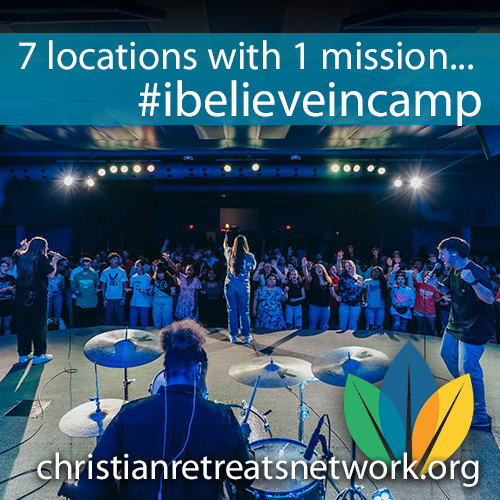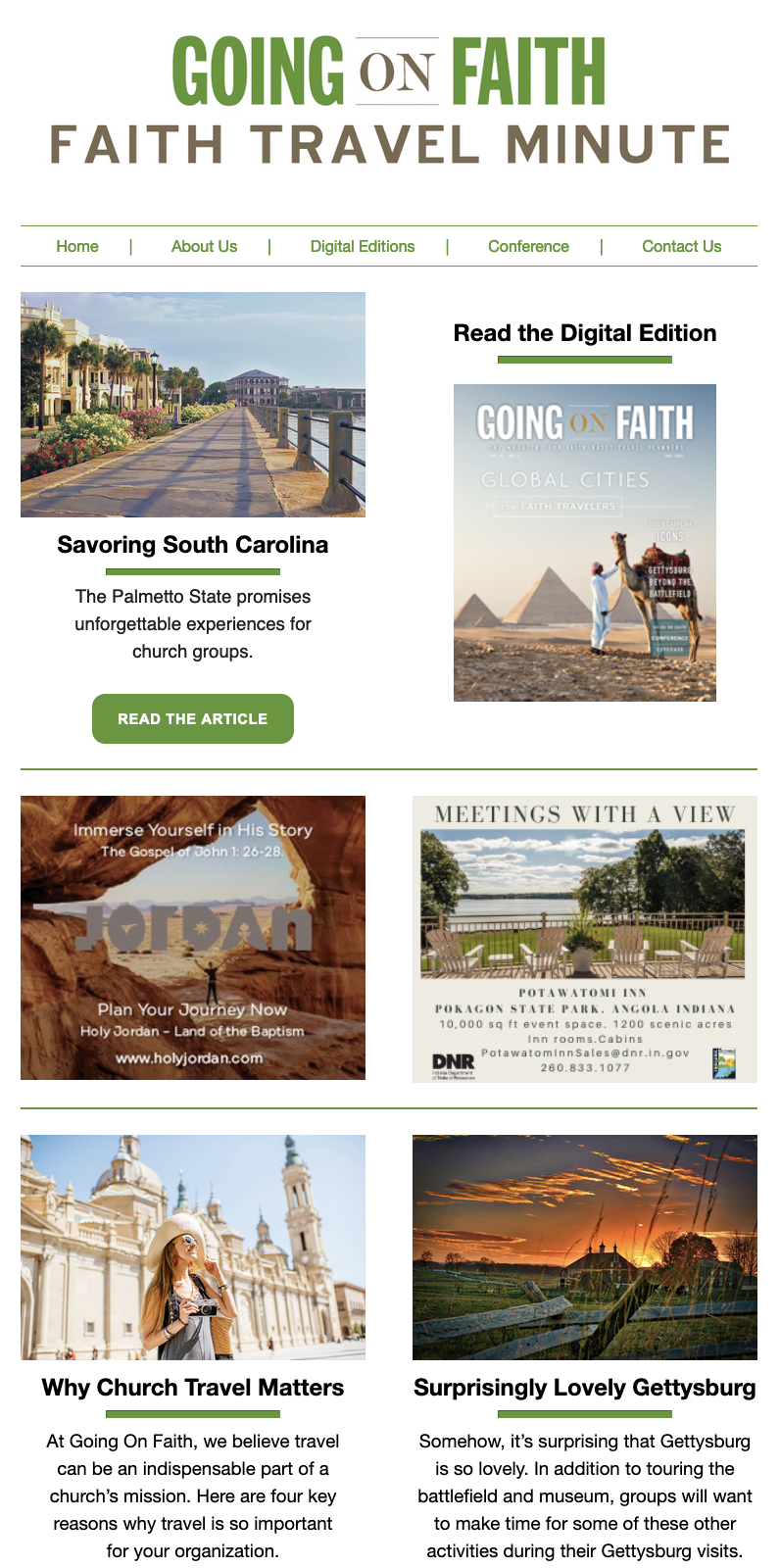 A Collette tour, photo by Brian Jewell
A Collette tour, photo by Brian Jewell
If you’ve ever found yourself up to your neck in paperwork — drowning in proposals, confirmation numbers and deposits before your trip even begins — chances are that you weren’t using the services of a tour operator.
When planning any kind of travel that goes beyond daytrips or quick overnight getaways to nearby destinations, group leaders can benefit immensely from the expertise and experience of professional tour operators. For extended itineraries or trips abroad, tour operators can be indispensable, deftly handing currency, language and cultural challenges that would be a nightmare for amateur group leaders.
There are a number of great reasons to use a tour operator to help with your church group trips, from value and reliability to planning and marketing services. But with dozens of companies vying for your attention and many options to choose from when planning a tour, group leaders should think carefully when selecting a tour operator. Choosing wisely will make your trip a rewarding and relaxing experience.
[ Value and reliability ]
Tour operators offer a number of advantages to group travel planners, including a level of on-the-ground experience in destinations near and far that few individuals can match.
“Tour operators are simply tried-and-true and proven performers,” said Mike Schields, managing director for groups and emerging markets at the Globus family of brands. “The ground operations have already been tested, priced, packaged and performed. When you make arrangements yourself, you don’t know how they’re going to deliver. But we have product planners that do all of these things.”
The benefits of this on-the-ground experience are hard to overstate: Tour operators work with the same hotels, restaurants, motorcoach companies and attractions over and over again. That means they will book your passengers with suppliers that have proven themselves with tour groups, providing reliable services year in and year out. In addition, a tour operator that runs a certain trip with regularity will have arranged and timed the itinerary in a manner that is most efficient and beneficial for your group.
Cost and value are also important considerations when working with tour operators. Although tour operators are effectively middlemen, and there is some markup in their package prices, the additional expense is often offset by the volume discounts they are able to secure from hotels and other suppliers.
“Group leaders get the benefit of a tour operator’s buying power, and that’s a big thing,” said Tony Etienne, vice president of business development at Collette Vacations. “We’re doing tours nonstop, operating in destinations on a year-round basis. It gives the group leader access to prices that they just can’t get on their own.”
Additionally, many tour operators offer guaranteed departures on their most popular itineraries. That means if you’re willing to share your tour with other travelers, you never have to worry about your tour not going because you had too few passengers sign up.
[ Start early, plan ahead ]
Once you decide to use a tour operator for a big trip, there’s still plenty to do, from researching companies and meeting with sales representatives to fine-tuning and marketing your trip to the congregation. Although it’s possible to book a trip in six months or less, most tour companies recommend that group leaders begin planning a trip a year in advance of travel, giving them plenty of time to research companies and itineraries.
As you begin to contact tour operators to plan your trip, having some knowledge about your group, as well as the companies you’ll be working with, will go a long way in helping make the most of their services. The following seven steps to working with tour operators will help you make the most of the experience for yourself and your group.
1) Determine what’s important.
Many of the decisions you will make when selecting a tour operator can be determined by the travel priorities of your group. Are you looking for a tour operator to offer a low price for individuals, or would you like to raise some money for your church or ministry as part of the tour? Will your travelers want to stay in nice hotels or more economical properties? Are you looking for an all-inclusive trip or a less expensive trip with fewer included meals and activities?
“You never get something for nothing,” Schields said. “My tour in Italy may be $1,899, and another guy’s is $1,299, but I promise that the level of hotels and inclusions is different. And I’ve seen some operators that are $500 to $600 more than us, but they’re including every single meal.”
Another important consideration is customization and exclusivity. Are you comfortable with other people joining your group, or do you want your church to tour alone? Are you happy to take a prepackaged tour, or are you looking to customize your itinerary? Group-exclusive tours and customized itineraries often cost more and leave the group leader with the responsibility of selling a minimum number of seats. Although smaller tour operators may be willing to build a customized tour, many of the major operators encourage groups to use prepackaged itineraries and then modify them as desired with pre- or post-tour stays.
2) Research tour companies.
There’s an almost limitless number of companies competing for your tour business; once you know what matters to your group, start to research the companies that fit your needs best.
“Do a Google search, and you’ll get a listing of the major players,” Schields said. “Try to use relevant terms like ‘Italy pilgrimage travel’ or ‘Holy Land tours,’ and you’ll get the most relevant results. Then you can narrow it down to two or three companies.”
Another tactic is to contact companies whose representatives you’ve met at established industry events such as the Going On Faith Conference or GLAMER Chapter Meetings. These operators specifically pursue church groups and know how to meet your needs. Beyond this, you can search the memberships of industry associations such as NTA, the American Bus Association or the U.S. Tour Operators Association.
3) Check references and get referrals.
Any tour company can put together an attractive brochure or Web itinerary, so the best way to judge companies is based on personal referrals and word of mouth.
“Really talk to other people outside the organization and get referrals and testimonials before you get to comparing comps or commission levels,” Etienne said. “I believe in the relationship side of things a lot. You’re going to work with these people for the next six to 12 months, so the more research you do and the more people you talk to before you work with the tour operator, the better.”
Group leaders can talk to pastors, other friends in the church or associates they’ve met in the travel industry to get background on a tour operator. Online searches can help with this, too — if a company has some unhappy customers or any sort of legal action filed against it, these issues will usually come up in a search engine query.
4) Meet and discuss.
Once you’ve selected a tour operator, a face-to-face or telephone conversation about your trip can be invaluable. Good preliminary meetings give the tour operator a chance to learn about your group and your travel needs, and to discuss any customization or other special circumstances. The tour operator can often help guide you toward the best itinerary for your group or suggest other options that you might not have considered.
“We’ve always been big on personal relationships with customers,” Etienne said. “Nothing beats sitting down and understanding the goal of the group leader. Once we understand what their goals and objectives are, we can put together the right tour and get them accomplished.”
5) Take advantage of marketing help.
One of the most difficult aspects of planning group travel can be recruiting folks to go along. But tour operators offer numerous tools to help you market your trip, from customized websites and brochures to on-site presentations.
“A major tour operator will have sales tools like photo libraries, CDs, presentations, flyers and postcards that they’ll be able to provide for the group leader and the church,” Schields said. “They should provide you with the materials, and they should be more than happy to come out and do a presentation for you.”
If it’s your first time planning a tour, don’t be afraid to contact your tour operator often with questions and concerns. They’ve likely handled issues like yours before, and they are there to help you through any issues.
“For a lot of people, it’s their first time,” Etienne said. “We can be here to hold their hand the entire way.”
6) Let the professionals handle the money.
Trying to collect and track payments from your tour members — and paying travel vendors during a trip — can be a hassle and can create unpleasant issues if something goes awry. Tour operators can help you take care of the financial nitty-gritty of your trip. Most companies have established payment schedules, which begin with an upfront deposit, sometimes include a second preliminary payment and then require the full balance due before the trip’s departure.
You can choose to collect money from your participants and then pay the tour company in a lump sum, or have your travelers pay the tour operator directly, thus eliminating your role as the financial middleman.
On a similar note, most tour operators will offer your group access to some sort of travel insurance or trip protection plan. The details of these plans differ: Some companies include them on all itineraries; others make them optional for an additional cost. Sometimes they are underwritten by the tour operator themselves; other operators use a third-party provider for insurance. Either way, the plans protect your travelers from trip cancelation or interruption due to illness, bad weather, missed connections and a host of other issues. Many plans also cover individuals in the case of medical problems during the trip. Including insurance in your trip package is one of the best financial moves you can make for your travelers.
7) Sit back and enjoy the trip.
One of the most surprising experiences for group leaders is how little work they have to do once they depart on a trip with a tour operator. All tour operators will provide experienced tour directors and bus drivers who handle all of the logistics, scheduling and narration of the trip once the tour begins. That allows you to relax, enjoy spending time with your congregation members and take in the sights without worrying about the itinerary.
Just as you rely on a tour operator’s sales support when setting up and marketing a trip, you can rely on their tour directors for guidance and support on the road. This leaves you free to focus on fellowship and ministry — the real purpose behind your church’s next trip.
Looking for a list of tour operators? View our listing online at www.goingonfaith.com.










